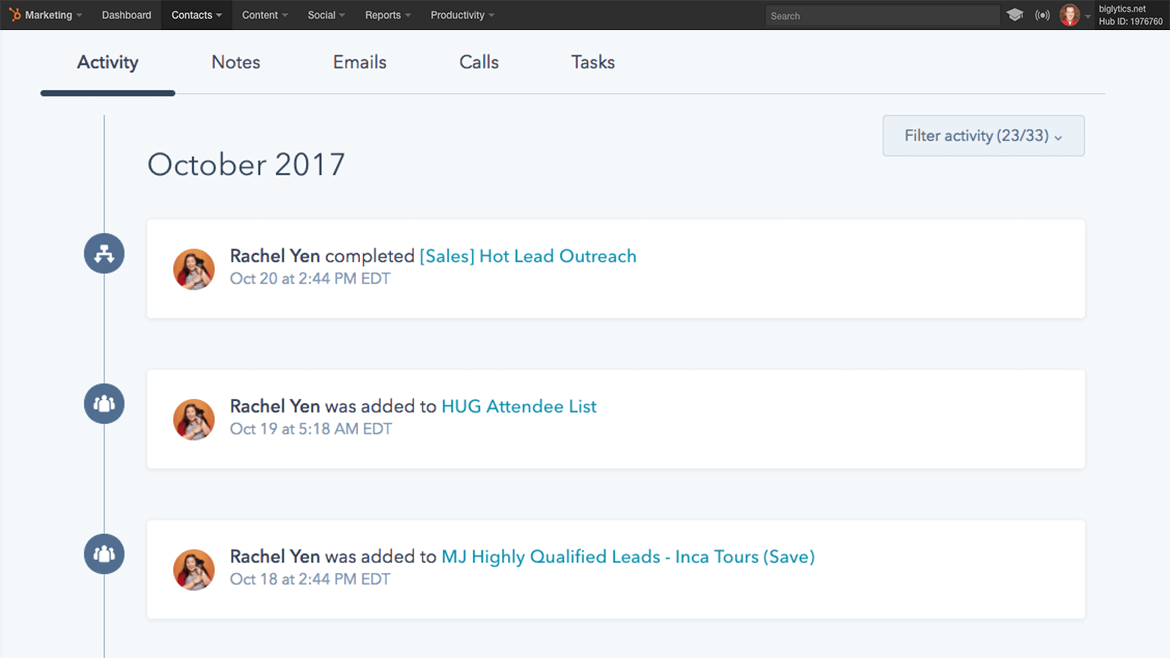Why You Should Care About Lead Scoring
Let's Begin
You’re an inbound marketing rock-star, and you’ve been generating leads faster than your sales team can follow up. Good for you! But don’t let your success become a burden on your sales team. There’s a way that you can narrow down the list of prospects for your sales team while also ensuring that more of the leads that they follow up on will convert. How is this possible? Lead scoring.
What is Lead Scoring? (Quick Recap)
Lead scoring lets you assign a value (a certain number of points) to each lead based on the profiling details they've given you and how they've engaged with your website and brand across the web. That data can help your sales and marketing teams prioritize leads, increase efficiency and decide what is the most helpful content for your prospect at a particular time.
Why Should You Care About Lead Scoring?
Not all leads are created equal. Just because you have someone’s contact information doesn’t mean that they are ready to buy from you now. Lead Scoring is a tool that marketing can put in place to rank potential customers from least-likely to most-prepared to buy.
Lead Scoring Can Help You:
1. Avoid bothering leads with contact from Sales if they’re not ready to buy or if they aren’t a good fit for your product.
2. Maximize the efficiency of your sales team so they can quickly identify and work only the leads who are sales-ready.
3. Build trust and favor with prospects by showing you're tuned in to their needs rather than the desire to sell to them.
Instituting a Marketing Qualified Lead (MQL) strategy can help improve the productivity of your Sales organization by feeding them fewer, but higher quality leads. If your sales team spends less time chasing down dead ends and more time pursuing people who are actively interested in purchasing your product, you’ll close more deals as a company. Lead scoring is at the heart of the "Inbound Methodology" and the mantra of help don't sell.
“You can’t out-spend the giants, but you can out-think, out-teach, and out-help them.”
Brian Halligan, Co-Founder HubSpot
What Makes for a Marketing Qualified Lead (MQL)?
First, you have to determine which demographics, activities, and behaviors qualify your leads as more or less likely to become a customer. Essentially you're trying to match information with intent. Consider these qualification categories:
Lead Information:
- Role/Job Title
- Company Size/Number of Employees
- Company Type/Industry
- Number of emails opened or links clicked within emails
Types of Interest:
- Requested a demo or specific information
- Viewed a particular type of product page
- Top-of-the-funnel interests (e.g., content downloads like ebooks and webinars) vs. more qualified middle-of-the-funnel benefits (e.g., product content like pricing pages or a free trial)
Activity Level:
- Number of Web Pages Viewed
- Number of Forms Completed (Content Downloaded or Inquiries Made)
"Targeting users with content relevant to their position along the buying process yields 72% higher conversion rates."
(Aberdeen Market Intelligence)
Assign Scores to Actions and Activities
Now you should ask, “Which of these criteria are most important in determining how ready someone is to buy?” Assign a point value from 1-10 to denote the value of each of these lead qualification items.
For example, if someone visits one of your blogs, that might be represented by 2 points because they’ve shown interest in topics related to your company. However, if someone visits five or more individual product pages, you might represent that action with 10 points because it appears that they are actively considering your options for purchase. Seems obvious, but make sure you consider what pages. There's a clear difference between someone browsing your careers and 'about us' pages compared to your case studies and pricing pages.
If you’re having trouble, take a look at the activity and qualifications of your past customers, so you can determine what lead qualities and actions have historically led to sales conversions.
Last Step:
Once you've set point values for each of your lead qualification criteria, decide at which point a total score would validate sending a lead to your sales team for a conversation.
On our point system, a customer’s consideration journey could be represented by a scale of zero to 100, zero being a first-time site visitor and 100 being a purchaser. As the customer accrues points by completing the qualification criteria, you can predict that they are more likely to convert when contacted by sales.
Good Communication is Key
Make sure that your Marketing and Sales teams are on the same page. New processes seem like a headache to implement, but if everyone understands that Lead Scoring is a benefit to all, they’ll be more likely to get on board and support the initiative.
We suggest determining together what lead score a potential customer has to reach to become an MQL ready for sales follow-up. Make it known, sales will be receiving fewer leads from marketing, but these leads will be more likely to convert, saving everyone from the wasted time and frustration that comes from pursuing unqualified leads.
Lead scoring qualifications change as customers interact with your site, so you’ll need to use lead management software set your lead scoring criteria to update your lead scores in real time.

For marketing teams using HubSpot, the Lead Management Tool makes this easy. Within HubSpot, you can even set up email alerts to notify your sales team when leads have accrued enough points to reach MQL status.
Conclusion
This was an introduction to lead scoring and why you should care about it. You should have a good handle on the basics and the potential for lead scoring to help your teams work better together, save time and money through focusing on the right people at the right time and ultimately make for a better customer experience.
If you want to dive deeper into the world of being a data-driven organization check out our guide on 6 Performance Metrics You Should Be Tracking.
Helpful? Leave a comment and let us know what else you like to know about lead scoring...


